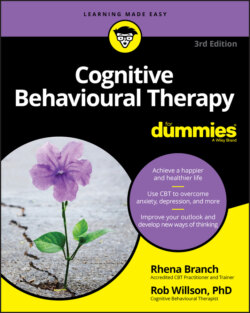Читать книгу Cognitive Behavioural Therapy For Dummies - Rob Willson - Страница 24
Spotting Errors in Your Thinking
ОглавлениеIN THIS CHAPTER
Identifying classic pitfalls in human thought
Correcting your thinking
Getting to know the thinking errors you make most
You probably don’t spend a lot of time mulling over the pros and cons of the way you think. Most people don’t – but to be frank, most people ideally ought to!
One of the central messages of CBT is that your thoughts, your attitudes and the beliefs you hold have a big effect on the way you interpret the world around you and on how you feel. So, if you’re feeling excessively bad, chances are that you’re thinking badly – or, at least, in an unhelpful way. Of course, you probably don’t intend to think in an unhelpful way, and no doubt you’re largely unaware that you do.
Thinking errors are slips in thinking that everyone makes from time to time. Just as a poor signal stops your phone from functioning effectively, so thinking errors prevent you from making accurate assessments of your experiences. Thinking errors lead you to get the wrong end of the stick, jump to conclusions and assume the worst. Thinking errors get in the way of, or cause you to distort, the facts. However, you do have the ability to step back and take another look at the way you’re thinking and set yourself straight. In this chapter we show you how to do just that.
Months or years after the event, you’ve probably recalled a painful or embarrassing experience and been struck by how differently you feel about it at this later stage. Perhaps you can even laugh about the situation now. Why didn’t you laugh back then? Because of the way you were thinking at the time.
To err is most definitely human. Or, as American psychotherapist Albert Ellis is quoted as saying, ‘If the Martians ever find out how human beings think, they’ll kill themselves laughing’. Ellis made that observation back in the ’60s, but not a lot has changed about our tendency to ‘think badly’ since. By understanding the thinking errors we outline in this chapter, you can spot your unhelpful thoughts and put them straight more quickly. Get ready to identify and respond in healthier ways to some of the most common ‘faulty’ and unhelpful ways of thinking identified by researchers and clinicians.
Albert Ellis was one of the founders of cognitive-based psychotherapy. He developed a treatment for emotional disorders called Rational Emotive Behaviour Therapy or REBT. A long-winded name, no doubt, but it basically involves much of what is in this book. Alongside Aaron Beck, who developed CBT for the treatment of depression and later further popularized CBT, Ellis developed the underlying philosophical foundations that still comprise CBT today. So if you are very keen on learning more about how CBT developed, look for books by Ellis and early work by Beck. You may also want to look at books by Windy Dryden, who has over 200 publications on the subject.
